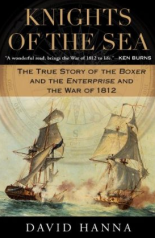The USS Enterprise and HMS Boxer have at it during the War of 1812 (although their clash occurred on Sept. 5, 1813)
There’s going to be a raft of books on the 200th anniversary of the War of 1812, and one of the first is a fascinating look at a pivot point in naval warfare. In Knights of the Sea, author David Hanna breathes life into the lone major sea battle witnessed from land in that conflict, which took place off Pemaquid Point, Maine.
It pitted the British brig HMS Boxer against the USS Enterprise in a pitched, broadside-blasting battle that lasted less than an hour. It marked the final round for this kind of maritime warfare, as well as telegraphing the U.S. Navy’s growing power and prowess. Hanna views much of the story through the Boxer’s captain, Samuel Blyth, and William Burrows, at the helm of the Enterprise. Battleland chatted with Hanna via email about the book:
Why did you write Knights of the Sea?
I wanted to know more about the two commanders who died as a result of the battle. How did they arrive at that moment in their lives? Why were they trying to kill each other?
What was the most important thing you learned in your research and writing?
That these men were like brothers, though they’d never met.
Sum up the battle between the Boxer and the Enterprise for us.
The Enterprise had a slight advantage in both firepower and manpower, and Burrows (the American commander) used it to win a clear victory, though the outcome was in no way assured in advance, and the actual battle was quite fierce.
Why was it important?
Just weeks before, James Lawrence and the Chesapeake had lost a bloody single-ship engagement with Philip Broke’s Shannon. This victory restored, to a large degree, Britain’s sense of itself as the dominant naval power. The earlier American victories in the war at sea could now be viewed as anomalies.
For the Americans, the boost these earlier victories had provided was significantly diminished. Burrows personally knew and admired Lawrence; Blyth (the Boxer’s commander) had volunteered to serve as pallbearer at Lawrence’s funeral in Halifax.
Burrows needed to win because America needed a win, but it was also personal. For his part, Blyth was expected to continue the reassertion of Britain’s naval mystique. So much of this was about perception.

David Hanna
Did it make any difference that this battle was witnessed from shore?
Yes, it does. All of the other single-ship actions at sea were fought out of view of landsmen. This battle could be seen blow for blow, and the noise would have been something that would have made a big impression.
Also, news of the two men-of-war out there off the Point had time to spread as Burrows took most of the afternoon of September 5th to gain the optimum position for his vessel before closing to engage the enemy.
It was a show, albeit a deadly one. The spectators, the common people, possessed this battle in a way unique to the war at sea.
What relevance does Knights of the Sea have to today’s naval forces?
Train, train, train. Never assume that naval dominance guarantees continued naval dominance. The Enterprise got off two accurate broadsides before the Boxer got off its second broadside, even though the Boxer had fired first.
This is not surprising when one looks at the war at sea in its totality. With the exception of Broke’s Shannon – known throughout the Royal Navy for the emphasis its commander placed on gunnery training – American crews were better trained, and American officers the equal or better of their British counterparts.
British complacency led to embarrassing losses, which in the larger scheme of things eroded their mystique. Why this was important at the time, and why it is important to our own navy today, is because once that mystique is successfully challenged it can encourage others to do the same.



